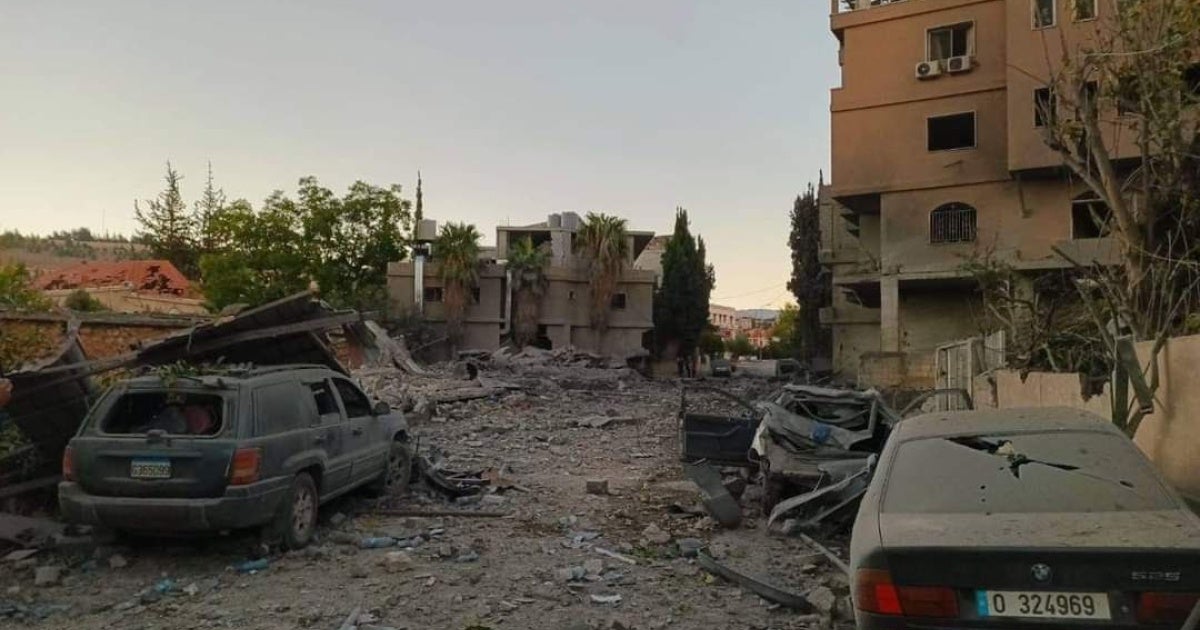
Israeli Strikes Target Civilians in Lebanon
Two unlawful Israeli strikes on the northeastern Lebanese town of Younine between September and November 2024, which killed 33 civilians, 15 of them children, were apparent indiscriminate attacks on civilians, Human Rights Watch said today.
At least one of the attacks used an air-dropped bomb equipped with a United States-produced Joint Direct Attack Munition (JDAM) guidance kit. The attacks should be investigated as war crimes.
“More and more evidence is emerging that Israeli forces repeatedly failed to protect civilians or adequately distinguish civilians from military targets during its strikes across Lebanon in 2023 and 2024,” said Ramzi Kaiss, Lebanon researcher at Human Rights Watch. “Lebanon’s government should provide a path for justice for grieving families, including by giving the International Criminal Court jurisdiction to investigate and prosecute crimes.”
In May 2024, Lebanon’s former government reversed a decision which it had issued a month earlier to give the International Criminal Court (ICC) jurisdiction to investigate and prosecute serious crimes committed on Lebanese territory since October 7, 2023. Lebanon’s new government should urgently accept ICC jurisdiction to give the court’s prosecutor a mandate to investigate serious international crimes committed on the country’s territory.
One attack, on September 25, killed a family of 23 people, all Syrians, including 13 children. On November 1, a strike on a two-story house killed 10 people, including 2 children, one of them a year old, 5 women, and 3 men. Human Rights Watch did not find any evidence of military activity or targets at either site.
Human Rights Watch investigated a third strike in Younine that occurred on November 21, which killed a family of four adults.Researchers found several Hezbollah “martyr” posters online and in Younine for one of the male victims, but were unable to verify who made the posters, and reviewed photos of his grave indicating that he may have been a Hezbollah combatant.
Between November 2024 and February 2025, Human Rights Watch researchers visited the sites of the two strikes in Younine, near Baalbeck, in eastern Lebanon. Human Rights Watch researchers also visited the cemetery in Younine and inspected the burial sites of people from the village killed in Israeli attacks, including combatants and civilians. Human Rights Watch reviewed photos and videos shared on social media in the aftermath of the strikes.
Human Rights Watch interviewed 10 people, some in person, at strike sites in Younine, and others via telephone. Weapon remnants found at the sites of the September 25 and November 21 strikes and reviewed by Human Rights Watch arms researchers indicate the Israeli military’s use of a Mk-80 series general purpose air-dropped bomb equipped with a US-made JDAM kit. Weapon remnants found at the site of the November 1 strike also indicate the Israeli military’s use of a Mk-80 series general purpose bomb.
The Israeli military did not warn civilians to evacuate before either strike, residents told Human Rights Watch. Human Rights Watch verified this claim by reviewing social media posts by the Israeli Arabic language spokesperson and the Israeli military’s Arabic language telegram channels, where evacuation warnings are typically shared. Human Rights Watch sent a letter outlining its findings and posing questions to the Israeli military on March 24 but has not received a response.
Under international humanitarian law, all parties to the conflict are obligated, at all times, to distinguish between combatants and civilians and to direct attacks only against combatants or other military objectives. Individuals who commit serious violations of the laws of war with criminal intent – that is, intentionally or recklessly – may be prosecuted for war crimes. Individuals may also be held criminally liable for assisting in, facilitating, aiding, or abetting a war crime. All governments that are parties to an armed conflict are obligated to investigate alleged war crimes by members of their armed forces.
When carrying out any attack, warring parties must take all feasible precautions to minimize civilian harm and damage to civilian objects. This includes taking all necessary actions to verify that targets are military objectives.
Between October 2023 and December 2024, Israeli attacks in Lebanon killed more than 4,000 people and displaced over one million. Since the November 27 ceasefire deal between Israel and Hezbollah came into effect, Israeli attacks have reportedly killed at least 146 people in Lebanon, including at least 26 who were attempting to return to villages where Israeli forces had not yet withdrawn. As of March 20, nearly 100,000 people remained displaced in the country from the recent conflict, according to the United Nations International Organization for Migration (IOM).
Lebanon and other United Nations member states should establish an international investigation into all human rights violations committed by all parties involved in the conflict in Lebanon. Such an investigation could document ongoing crimes, collect evidence, and publicly report on their findings. Lebanon’s government could also further its cooperation with the United Nations Office of the High Commissioner for Human Rights (OHCHR) and ongoing investigations into Israeli attacks in Lebanon to ensure accurate documentation of unlawful attacks, including war crimes committed between October 2023 and December 2024.
The United States government’s provision of arms to Israel, which have repeatedly been used to carry out apparent war crimes, has made the US complicit in their unlawful use. Human Rights Watch has previously documented the unlawful use of US weapons in and unlawful attack on aid workers and an apparently deliberate attack on journalists in Lebanon.
Providing military assistance to Israel violates US law, which prohibits arms transfers to “any country the government of which engages in a consistent pattern of gross violations internationally recognized human rights.” All states, including Israel’s key allies such as the United States, the United Kingdom, Canada, and Germany should suspend military assistance and arms sales to Israel.
Lebanon’s parliament should also ratify the Rome Statute of the International Criminal Court, Human Rights Watch said.
“Countries still supplying Israel with arms, including primarily the United States, need to wake up to the reality that their continued military support, despite ample evidence of unlawful attacks, has made them complicit in the unlawful killing of civilians,” Kaiss said. “Victims have a right to justice and reparations, and those responsible should be held to account.”
After 10 p.m. on September 25, an Israeli airstrike struck a residential building along the main Baalbek-Qaa highway near the road junction that leads into the center of the town of Younine, killing 22 members of one extended Syrian family, including 13 children. Another family member died eight days later in a Damascus hospital as a result of his injuries. Seven people survived the attack, including three Lebanese men, six of them with various injuries.
Human Rights Watch interviewed multiple sources about the incident, including four survivors, the building’s owner, who is also the mother of one survivor, a local supermarket owner who was among the first to arrive at the scene, the mayor of Younine, a relative of the family who lives in Idlib, Syria, and a Lebanese researcher familiar with the town.
Researchers verified photos and videos of the immediate aftermath, the burial of the victims two days later, and satellite imagery. They cross-referenced a list of casualties provided by the family’s relative in Idlib with Younine’s mayor and two survivors. Researchers conducted open-source research into the names of both victims and survivors, to establish if any of them may have been or are combatants, and cross-referenced findings with open-source material shared by Airwars, a nongovernmental organization that investigates civilian harm in conflict zones. During a December 2 visit to the site, researchers viewed remnants of a bomb equipped with a United States-produced JDAM guidance kit found in the rubble.
Witnesses said that the two-story building contained two apartments on the ground floor, both rented to Syrians. The family living in the other ground floor apartment was not present at the time of the attack. Two other buildings sharing the same owner are attached to the building, one of which housed the three other branches of the Abdelkader family, and another that housed the owner and five of her other children, who had fled the building soon after Israel intensified its aerial campaign on Lebanon in September 2024. The buildings also housed a physical therapy center, a mobile phone shop, and a shuttered gas station that had been out of operation for over a year.
“My uncle’s family who lived in that building, they were planning to leave to Syria the next morning so we were all gathered there to say goodbye,” said Yousef Abdelkader, 16, who alongside his brother Mohammad, 17, and their cousin, 15-year-old Hassan, were the only survivors from the Abdelkader family in the building at the time of the attack. The attack killed their parents, siblings, grandfather, and two uncles’ families.
“Just before the strike, I left the apartment ahead of the rest of my family to return to my family’s apartment in one of the attached buildings. My mom, grandpa, and others were still standing just outside the door talking to the rest of the family when I heard the sound of a plane, and I saw the rocket fall,” said Yousef.
Other survivors were a distant relative who also lived in Younine, the building owner’s son, who lived on the second floor, and two Lebanese neighbors. Waleed Rbeidi, the relative, said: “[When the bomb struck], I was on the ground-floor veranda with some other men from the neighborhood, friends of mine, who had called over to me to have coffee with them.”
Rbeidi and another survivor both said that they received no warning ahead of the attack. “We just heard the sound of the rocket and suddenly the house fell over their heads,” he said, telling researchers that doctors had to later remove several pieces of shrapnel from his body.
“There was no warning,” said the building owner’s son. “The munition came straight down on us. Each of us [standing in the veranda] flew in a different direction.”
Another Lebanese survivor, who lives on the same street and owns a shop nearby, described the moments leading up to the attack: “We were all staying up late together that night. For a couple of hours before the strike, I remember we didn’t hear any drones, it was quiet. All I remember from the strike is hearing a loud noise and then I lost consciousness. I spent 20 days in the hospital with shrapnel in my leg, arm, and neck.”
The Israeli military did not comment directly on the strike, but it posted on X and Telegram the next morning that its forces had struck approximately 75 Hezbollah targets in the Bekaa area and in southern Lebanon overnight, including “weapons storage facilities, ready-to-fire launchers, terrorists, and terrorist infrastructure.”
Younine’s mayor, Ali Kassas, said that two other airstrikes had targeted the town earlier that day. Human Rights Watch found no evidence of a military target in the immediate area of the September 25 strike and all those interviewed insisted there were no fighters or military equipment in the building or the neighborhood. “We are still trying to make sense of the strike, to find a reason for it,” Kassas said. “We still can’t understand why they would target a building full of Syrians. They’re not even Lebanese. The entire intersection is mostly Syrians, many […] camps around and most buildings rented to Syrians.”
Kassas described the rescue efforts: “We headed to the location immediately after we learned of the strike, ambulances too, and we pulled bodies from under the rubble. On the first day we pulled 19, we didn’t even know how many people were in the building to begin with or who they were. There was a boy who was a relative of some of the dead and he helped us identify them and said that there were others missing, including his uncle and aunt. The second day we went back and pulled out three more.”
“After the strike, dead bodies were strewn across the ground,” said Yousef, who helped rescuers identify his family members who were killed. “It was really hard for me to identify them because some of them were in pieces.”
At around 2 p.m. on November 1, an Israeli strike on the al-Salah neighborhood in Younine destroyed a two-story building.
Human Rights Watch researchers visited the site on December 2, 2024, and February 12, 2025, and interviewed Ali Salah, who lost 10 family members in the strike. Salah lived in the same neighborhood and was in the vicinity at the time of the attack. On February 12, Human Rights Watch also spoke to another neighbor and relative of the Salah family who lived in the same neighborhood and spoke with the mayor of Younine about the strike on March 21.
Ali Salah said that those killed in the strike included his two sisters, Wadha, born 1959, and Fairouz, born 1975; his brothers-in-law:, Haidar Mahdi Salah, who worked as a painter and owned a supermarket, and Mohammad Mahdi Salah, who worked as a taxi driver; his nieces, Elissar, 27, and Zeina, 17; his nephew Ali Haidar Salah, 30, and Ali’s family, including his wife, Nour Boudaq, his son, Haidar, a year old, and his mother-in-law, Um Bachir Boudaq.
“Haidar [Mahdi Salah] works as a painter, and Mohammed works as Taxi driver,” Ali Kassas, the mayor, told Human Rights Watch. “Ali Haidar works with his dad as a painter, and the rest were children and women. Haidar [Ali Salah] was just one year old […] None of the people killed were combatants. They’re not even connected to any party.”
The strike came shortly after Mohammed Mahdi Salah returned home after finishing his shift as a taxi driver, Ali Salah said.
“Mohammed makes about LBP50,000 [around US$0.55] for a ride in the Bekaa,” he said. “All our family, the Salah family, we don’t have a single person in Hezbollah. Not a single person. Ask whoever you want.”
“There’s no one I value more than my sisters. If I thought there was any reason for there to be a military target here, I would have forced them to leave. There was nothing here. Just civilians.”
The Israeli military did not comment directly about this strike. However, a post shared on the Israeli armed forces’ telegram page on November 2, one day after the strike, stated that “over the past day, the [Israeli Air Force] struck more than 120 terror targets belonging to both Hamas and Hezbollah. These included anti-tank missile launching sites, terrorist operatives, terror infrastructure sites, weapons storage facilities, and command centers in Lebanon.”
Human Rights Watch conducted open-source research on the strike, including into the names of those killed, to determine if they were combatants. Researchers did not find any evidence indicating the presence of combatants or a military objective at the site of the strike. All individuals interviewed said that no evacuation warning was given to residents prior to the strike.
A banner outside the cemetery in Younine, which Human Rights Watch researchers visited, displayed the names and photos of people from Younine who were killed in Israeli attacks, including civilians and individuals who appear to be combatants. Photos of the male victims of the November 1 attack – including Mohmmad Mahdi Salah, Haidar Mahdi Salah, and Ali Haidar Salah – showed them in civilian clothing and appear to be designated as civilians below the photographs of apparent combatants. The names of women killed in the strike were displayed without photos. None of the individuals killed in the November 1 attack were buried in an area within the cemetery that appeared to be reserved for Hezbollah fighters.
Ali Salih described his anguish over the death of his family members. “Um Bachir [Salih’s mother-in-law] wanted to go to Ghobeiry, in Dahyeh [Beirut’s southern suburb], and I would tell her, ‘If I tell you to leave and you get killed, I will feel very guilty; If you stay and get killed, I’ll also feel very guilty. So do as you want.'”
Kassas, the mayor, who arrived at the site of the strike shortly after the attack, described horrific scenes: “The scene at the strike made our hearts cry. Some bodies did not have heads attached to them. Other bodies were flattened by the strike. One person, we just knew them by their skin and beard […] We tried to resuscitate the child [Ali Haidar] when we pulled him out, but when we checked for a pulse, he was dead.”
Click to expand Image
Destruction from an Israeli airstrike on September 25, 2024, that struck a residential building along the main Baalbek-Qaa highway near the road junction that leads into the center of the town of Younine, Lebanon. © 2024 Human Rights Watch
https://www.hrw.org/news/2025/04/23/lebanon-indiscriminate-israeli-attacks-civilians


